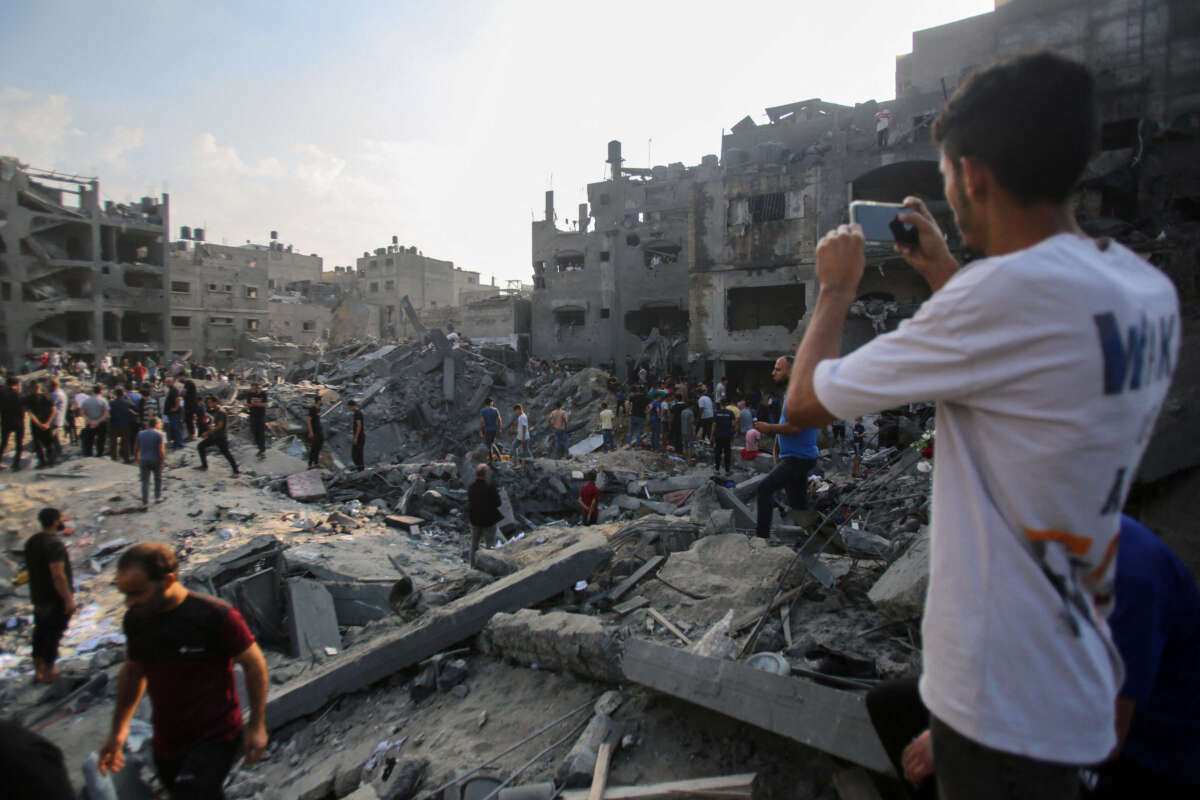Did you know that Truthout is a nonprofit and independently funded by readers like you? If you value what we do, please support our work with a donation.
Last year, just days into Israel’s genocide in Gaza, a bureau within the State Department raised objections to over a dozen arms shipments to Israel, citing “gross violations” of human rights by the unit slated to receive them. But these objections were ignored, a new report finds, and that unit would later be involved in the single deadliest massacre of the genocide so far.
A Reuters report published Friday finds that, on October 14, 2023, a senior defense adviser within the Israeli Embassy in Washington, D.C., Ori Katzav, emailed a State Department division that approves arms sales to expedite a shipment of 20,000 automatic rifles to the Israeli national police, which includes a so-called counterterrorism unit known as the Yamam.
Per Reuters, a State Department official asked the agency’s Democracy, Human Rights, and Labor (DRL) bureau to review the sale. DRL deputy assistant secretary Christopher Le Mon recommended that the department deny 16 arms packages, which included rifles and gun parts, as well as grenade launchers. In an email, he cited Yamam’s activities in particular, writing about “numerous reports” of the unit’s “gross violations of human rights.”
But nearly all of the sales went through anyway, according to Reuters. Eight months later, in June, Yamam carried out a massacre in Nuseirat refugee camp that killed at least 274 Palestinians and injured nearly 700 others. Israeli forces retrieved four Israeli captives in that attack — the single deadliest attack of Israel’s genocide.
This exchange — in which internal recommendations to stop arms shipments were ignored by State Department officials — is one of many similar exchanges that have occurred within the department throughout the Gaza genocide, according to a ProPublica report published on Friday.
According to ProPublica, there has been a slew of recommendations within the State Department for partial or total suspension of arms sales to Israel under U.S. and international laws prohibiting weapons transfers to human rights violators. But top State Department appointees have repeatedly rejected these recommendations, despite clear evidence of violations by Israeli forces — and instead, State Department staffers have worked overtime to clear weapons shipments, ProPublica found.
There were other early warnings within the department. According to Reuters, several State Department officials emailed top State Department figures like top Middle East White House adviser Brett McGurk warning of potential war crimes being committed by Israeli forces beginning on October 11, just days after Israel first embarked on its genocide and before it had commenced its ground invasion of Gaza.
In these messages, encompassing three email chains, State Department officials warned of the human rights violations already being committed in Gaza. Diplomacy official Bill Russo said that the U.S. is risking “being complicit to potential war crimes by remaining silent on Israel’s actions against civilians,” as Israel was striking hospitals and announced a total blockade of Gaza.
Two days later, a deputy assistant secretary of defense for the Middle East, Dana Stroul, warned that Israel’s forced evacuation of 1 million Palestinians in northern Gaza would lead to war crimes charges for Israel, and noted that it is impossible to evacuate that amount of civilians in just the 24 hours allotted; one official said it would lead to a “humanitarian catastrophe.”
In reply, McGurk — who has been a key figure maintaining the U.S.’s role in Israel’s genocide — said that the U.S. may be able to extend the evacuation window, but did not object to the evacuation itself. He then reportedly likened the evacuation order to a U.S.-led military incursion against the Islamic State in Mosul, Iraq, in 2016 and 2017, in which over 600,000 civilians were displaced and nearly 6,000 civilians were killed.
Press freedom is under attack
As Trump cracks down on political speech, independent media is increasingly necessary.
Truthout produces reporting you won’t see in the mainstream: journalism from the frontlines of global conflict, interviews with grassroots movement leaders, high-quality legal analysis and more.
Our work is possible thanks to reader support. Help Truthout catalyze change and social justice — make a tax-deductible monthly or one-time donation today.
